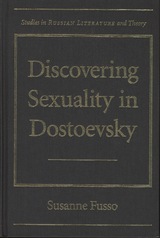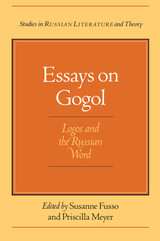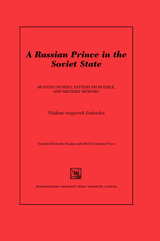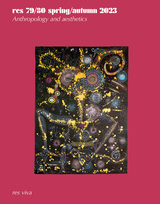4 books about Fusso, Susanne

Discovering Sexuality in Dostoevsky
Susanne Fusso
Northwestern University Press, 2008
Most discussions of sexuality in the work of Dostoevsky have been framed in Freudian terms. But Dostoevsky himself wrote about sexuality from a decidedly pre-Freudian perspective. By looking at the views of human sexual development that were available in Dostoevsky's time and that he, an avid reader and observer of his own social context, absorbed and reacted to, Susanne Fusso gives us a new way of understanding a critical element in the writing of one of Russia's literary masters. Beyond discovering Dostoevsky's own views and representations of sexuality as a reflection of his culture and his time, Fusso also explores his artistic treatment of how children and adolescents discover sexuality as part of their growth.
Some of the topics Fusso considers are Dostoevsky's search for an appropriate artistic language for sexuality, a young narrator's experimentation with homoerotic desire and unconventional narrative in A Raw Youth; and Dostoevsky's approach to a young man's sexual development in A Raw Youth and The Brothers Karamazov. She also explores his complex treatment of a child's secret sexuality in his account of the Kroneberg child abuse case in A Writer's Diary; and his conception of the ideal family, a type of family that appears in his works mainly by negative example. Focusing mainly on sexual practices considered "deviant" in Dostoevsky's time--both because these are the practices that his young characters confront and because they offer the most intriguing interpretive problems--Fusso decodes the author's texts and their social contexts. In doing so, she highlights one thread in the intricate thematic weave of Dostoevsky's novels and newly illuminates his artistic process.
Some of the topics Fusso considers are Dostoevsky's search for an appropriate artistic language for sexuality, a young narrator's experimentation with homoerotic desire and unconventional narrative in A Raw Youth; and Dostoevsky's approach to a young man's sexual development in A Raw Youth and The Brothers Karamazov. She also explores his complex treatment of a child's secret sexuality in his account of the Kroneberg child abuse case in A Writer's Diary; and his conception of the ideal family, a type of family that appears in his works mainly by negative example. Focusing mainly on sexual practices considered "deviant" in Dostoevsky's time--both because these are the practices that his young characters confront and because they offer the most intriguing interpretive problems--Fusso decodes the author's texts and their social contexts. In doing so, she highlights one thread in the intricate thematic weave of Dostoevsky's novels and newly illuminates his artistic process.
[more]

Essays on Gogol
Logos and the Russian Word
Susanne Fusso and Priscilla Meyer
Northwestern University Press, 1994
These fourteen essays reflect the increasingly interdisciplinary character of Russian literature research in general and of the study of Gogol in particular, focusing on specific works, Gogol's own character, and the various approaches to aesthetic, religious, and philosophical issues raised by his writing.
[more]

Essays on Karolina Pavlova
Susanne Fusso and Alexander Lehrman
Northwestern University Press, 2001
A collection of essays by American, Russian, and German scholars examining the work of the poet Karolina Pavlova.
[more]

A Russian Prince in the Soviet State
Hunting Stories, Letters from Exile, and Military Memoirs
Vladimir Trubetskoi
Northwestern University Press, 2006
Of a noble and distinguished family disenfranchised by the Bolshevik revolution, Vladimir Trubetskoi (1892-1937) alone remmained in Russia, and suffered the consequences.His life and experiences are well documented in this remarkable volume, a selection of his writings that reflects his comfortable prewar existence and his post-revolutionary poverty, uncertainty, and displacement, all conveyed with humor and ironic detachment. Including selections from Trubetskoi's memoirs, his letters from exile in Uzbekistan, and his hunting stories, the chapters of this volume offer autobiographical narratives of the self, creative "reflections," ethnography, and, most of all, uniquely evocative and informative instances of history lived and recorded with quiet power and irrepressible character.
In his letters from exile, Trubetskoi describes his grim situation in Central Asia-how he snatched moments to write between mornings playing piano in a ballet studio and late nights in a restaurant band, struggling with the heat, the insect-borne illness, and the problems of a large, uprooted family. His memoirs of 1911-12, "Notes of a Cuirassier," are the culmination of his efforts and they convey in vivid detail the glittering prewar world of an elite Russian Guards regiment. These reminiscences as well as his stories offer a glimpse of what life was like for a citizen of Imperial Russia who tried to make a life for himself in the new Soviet state. Instructive, amusing, moving, Trubetskoi's stories are also an inspiring example of how a person of grace and true nobility meets large-scale social and political upheaval.
In his letters from exile, Trubetskoi describes his grim situation in Central Asia-how he snatched moments to write between mornings playing piano in a ballet studio and late nights in a restaurant band, struggling with the heat, the insect-borne illness, and the problems of a large, uprooted family. His memoirs of 1911-12, "Notes of a Cuirassier," are the culmination of his efforts and they convey in vivid detail the glittering prewar world of an elite Russian Guards regiment. These reminiscences as well as his stories offer a glimpse of what life was like for a citizen of Imperial Russia who tried to make a life for himself in the new Soviet state. Instructive, amusing, moving, Trubetskoi's stories are also an inspiring example of how a person of grace and true nobility meets large-scale social and political upheaval.
[more]
READERS
Browse our collection.
PUBLISHERS
See BiblioVault's publisher services.
STUDENT SERVICES
Files for college accessibility offices.
UChicago Accessibility Resources
home | accessibility | search | about | contact us
BiblioVault ® 2001 - 2024
The University of Chicago Press









